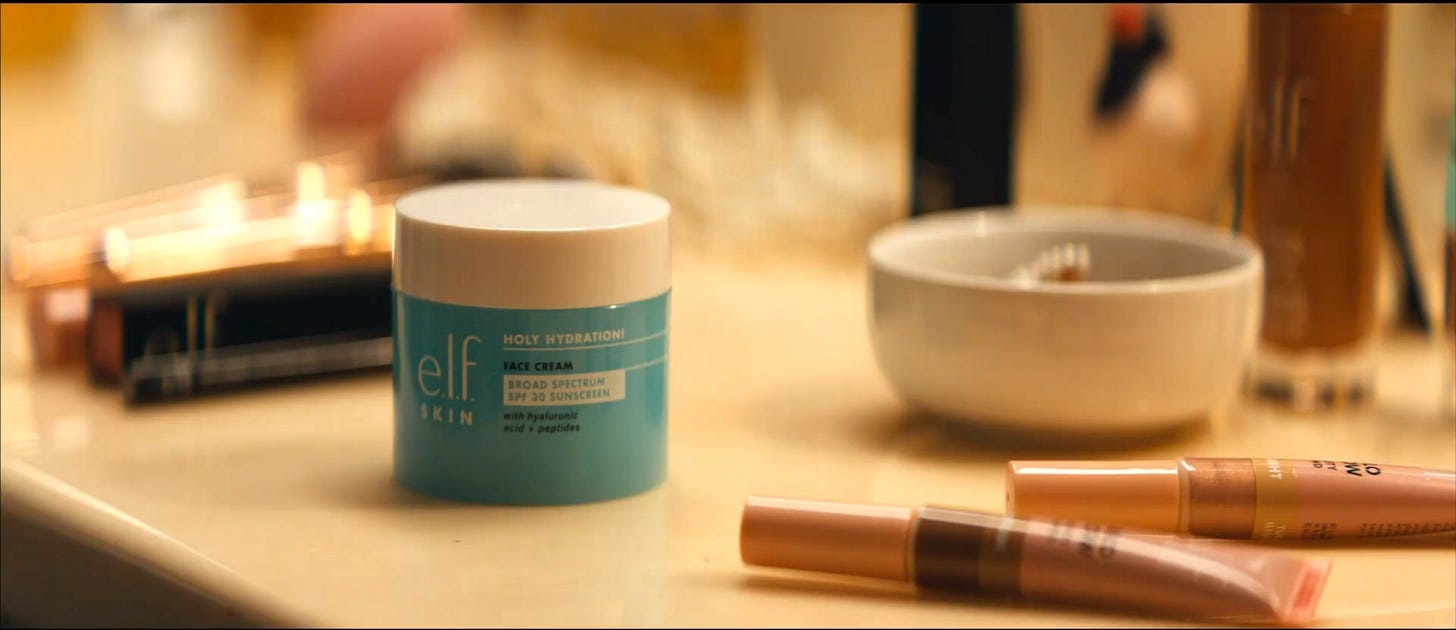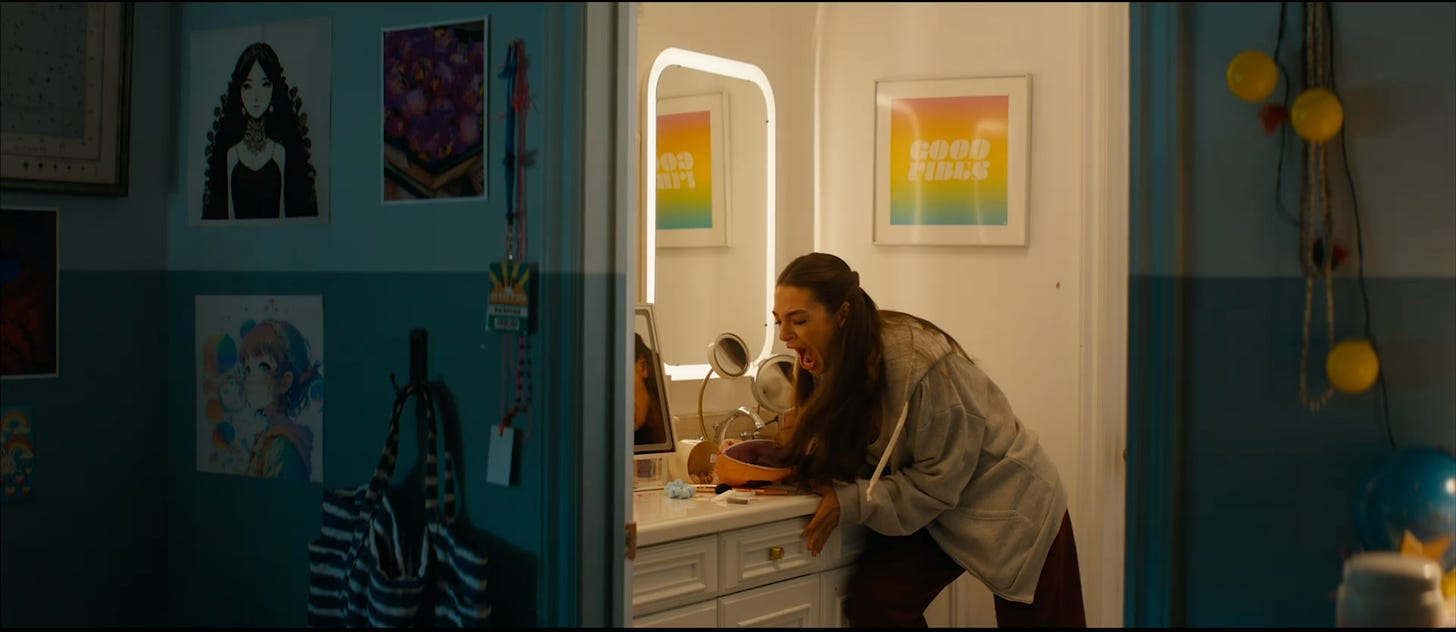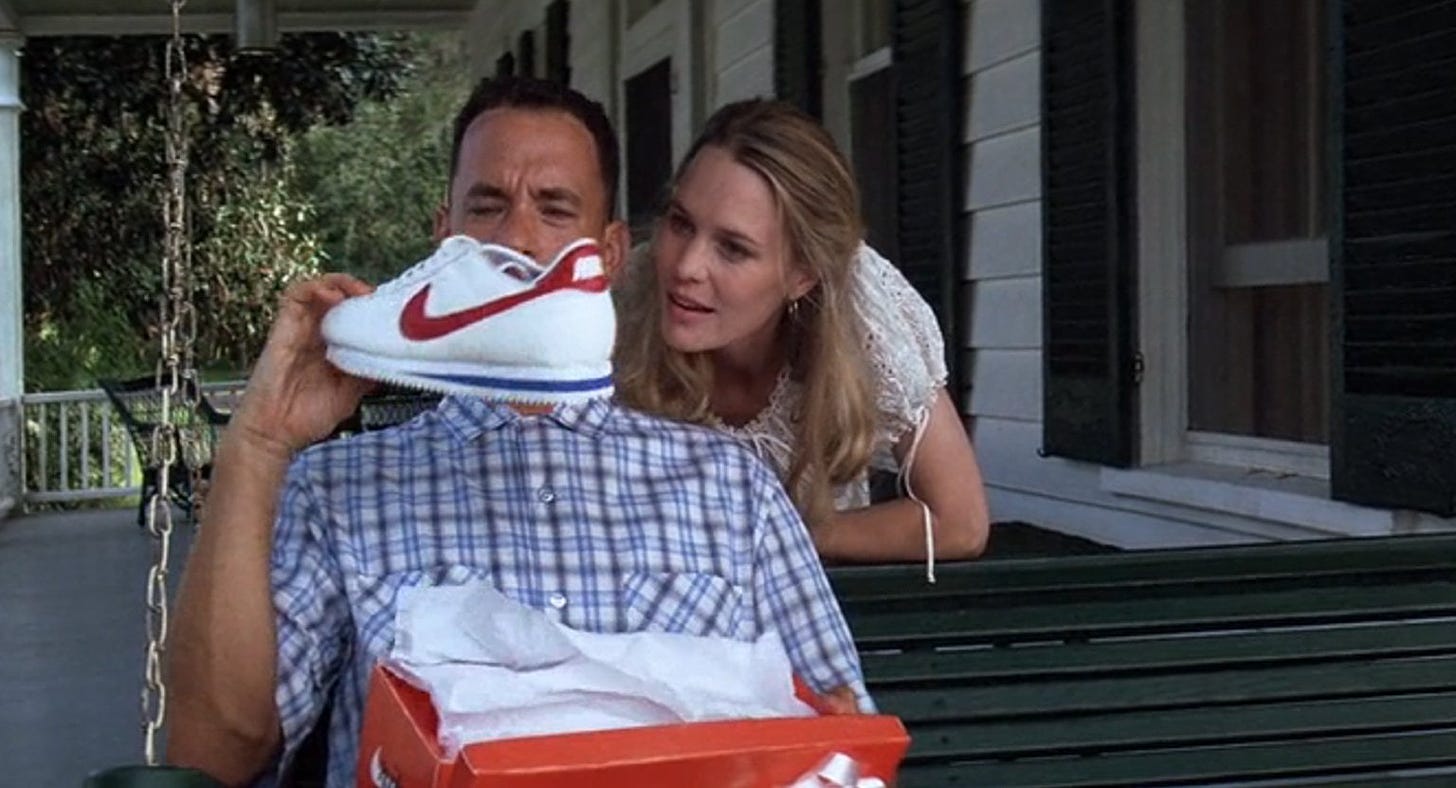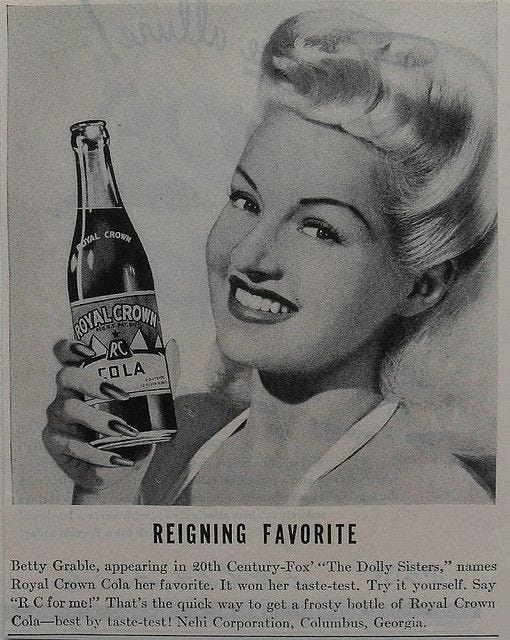The Art of the Shameless Plug
When I went to see Mean Girls on Tuesday, it became immediately apparent that e.l.f. Cosmetics had given them money. Quite a bit of money. And they were pretty shameless about it. So shameless, in fact, that before the movie started there was a trailer for what seemed to be a very tongue-in-cheek mockudrama called Cosmetic Criminals.
This short film, which can be viewed either on Amazon Prime or on e.l.f.’s website (see what they did there?) is all about a teenager named Olivia who goes into her bathroom one morning before school, only to find to her utmost shock and horror, that all her makeup is missing. Naturally, she only uses e.l.f. products.
There’s no evidence of the culprit beyond a soiled washcloth, and in the Cosmetic Criminals world, taking off one’s makeup means leaving a perfect facial imprint on the washcloth a la the Shroud of Turin.
To make matters worse, Olivia’s boyfriend is all set to ask her to prom in the most public way possible (he’s dressing up in a bear suit and filming the whole thing for social media, of course), but Olivia, aghast at being filmed without her trusty maquillage, goes ballistic and pushes the poor guy into a wall of lockers.
So who took the makeup? That is indeed the big question. No matter the answer, Cosmetic Criminals is both brilliant and brazen.
Product placement in films is, of course, nothing new, at least in the last fifty years or so. Filmmakers and studios have had to figure out as many ways of generating revenue as possible, and advertising various products has always been one of the surest ways to do that. In some movies it comes off better than in others, but it’s mostly always there.
Prior to the breakdown of the studio system, though, product placement in movies was almost non-existent, apart from very rare instances such as Esther Williams subtly advertising Cole of California swimsuits in Neptune’s Daughter. Stars did do print ads, which always credited their studio and mentioned their current film, but the stars had very little involvement with the products they pitched and didn’t receive endorsement fees.
Companies also made short films promoting their products. Yeah. Infomercials. Sometimes these featured stars or character actors and sometimes they didn’t; the obvious idea was to get a company’s name out to the public and create the need for whatever was being sold. Where these films were exhibited is hard to say, but my guess is they may have been shown in movie theaters.
Nowadays, of course, these films are incredibly dated, but they can also be interesting viewing. Granted, there is abundant corn and cheese to be had, not that there’s anything wrong with that. Here are just a few examples out of the dozens of early infomercials and examples of product placement that can be found on YouTube.
The Infernal Cauldron (1903)
From Georges Melies, the filmmaker who also brought us A Trip To the Moon, comes The Infernal Cauldron, about an evil green creature who drops hapless victims into his giant receptacle. Come for the remarkable special effects, stay for the unintended consequences.
And how does this fit in with our shameless plug theme? Well, Melies had to prominently display his company logo in his films because his rivals always wanted to pirate his stuff. It didn’t stop hacks from sticking in their own logos, but at least it made the hackery really obvious. In this case, the logo is on the base of the cauldron.
The Middleton Family At the New York World’s Fair (1939)
This is a remarkable film put out by the Westinghouse Company that not only documents new gadgets that were on the horizon prior to the Second World War, but is an accurate visual record of the 1939 New York World’s Fair. There’s also quite a bit of time devoted to the time capsule that was buried there and what kind of surprises await the fortunate soul who, God willing, opens it up five thousand years from now.
Our conduits to the festivities are the Middletons (no relation to the Princess of Wales, of course), who have come to New York to see the fair and their daughter, who lives in New York and has a new boyfriend. Too bad he’s an insufferable snob.
Tomorrow Always Comes (1941)
After getting married, having a baby, and expressing her distaste at the fabrics of her day, an Edwardian woman is transported to the modern day, where she experiences the wonders of NewForm’s Bur-Mil Rayon Fabrics and 1940s fashion. One has to wonder how much she’ll loathe her chemise and corset when she does go home again.
NewForm tried really, really hard here, but logic leaps were made, particularly regarding our heroine’s expectations before she goes forward in time. Oh well.
Dinner At 6 (1946)
Mrs. Smith wants to send her daughter to university, but she and Mr. Smith can’t afford it. Their only option is to butter up a certain elderly relative with very deep pockets, starting with a fabulous dinner. Problem is, Mrs. Smith’s oven door is on the floor and she can’t cook the dinner with a broken stove. All seems lost until her daughter’s boyfriend suggests spiriting the food to his house, where they can use his mother’s new electric stove. No one will ever know, right?
This Westinghouse promotional is exceedingly corny but also exceedingly fun, as one Margaret Hamilton is in on the proceedings.
Food For Thought (1949)
After the Second World War, the Presto Company was just beginning to manufacture its products again, and films such as this capitalized on Americans’ eagerness to try new things.
Spring Byington plays a mother who waxes lyrical about her daughter Carol and Carol’s discovery of the Presto Pressure Cooker. Connie Marshall as Carol carries the lion’s share of the action, cooking competently and smiling winningly. Besides the obvious idea of pressure cookers making life easier, Carol’s sudden enthusiasm for cooking may have piqued mothers’ interest.
Young Man’s Fancy (1952)
Presented by the Edison Electrical Institute, Young Man’s Fancy doesn’t so much advertise a brand as sell households on going all-electric. Teenager Judy is constantly helping her mother do laundry, cook, vacuum, and package fruits and vegetables to stock their new coffin freezer. Her college student brother is home on vacation and he’s brought a friend with him, Alexander Phipps.
Judy is smitten, but Alexander won’t be easy to win. As they say, though, the way to a man’s heart is through his stomach…
1999 A.D. (1967)
Put out by the Ford Motor Company, this is probably the most subtle of our product pitches because it doesn’t mention Ford by name at all. The most it does is emphasize how easy travel is, as in, people who live in, say, the Midwest, can go day-tripping to Monterey for lunch and golf. Someone who lives in Paris can jet to the States in no time for a dinner party. It’s all smooth as glass. We can only presume the folks at Ford were hoping they could invent a Star Trek-like transporter room before the new millenium rolled around.
Other than that, the film is mostly predictions of life in 1999, and we all know half the fun of films like this is seeing how many predictions came true. Oh, and there’s also a brief encounter with a (male) Puerto Rican singer who can hit high notes that would make Mariah Carey jealous.
Ah, product placement. When it’s good, it’s very, very good. When it’s not so good it can be annoying. When looked at through the lens of history, it can be immensely entertaining.








